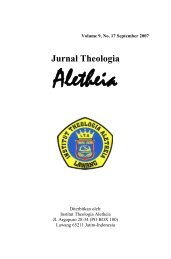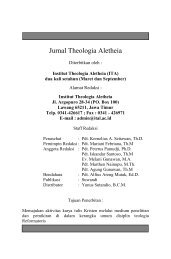download - Sekolah Tinggi Theologia Aletheia Lawang
download - Sekolah Tinggi Theologia Aletheia Lawang
download - Sekolah Tinggi Theologia Aletheia Lawang
You also want an ePaper? Increase the reach of your titles
YUMPU automatically turns print PDFs into web optimized ePapers that Google loves.
74<br />
sent his Son that by believing in him we might have everlasting<br />
life. Because the Word explains Christ, faith and the Word are<br />
always joined. Calvin rejects at length the ―implicit faith‖ taught<br />
by the Roman Catholic church of his day—a faith in the church<br />
and its work as sufficient for salvation—since it obscures Christ<br />
and mutes the Word. It imperils both true faith and salvation. True<br />
faith is ―a firm and certain knowledge of God‘s benevolence<br />
toward us, founded upon the truth of the freely given promise in<br />
Christ, both revealed to our minds and sealed upon our hearts<br />
through the Holy Spirit.‖ 83 Calvin rejects the scholastic distinction<br />
between ―formed‖ and ―unformed‖ faith, acknowledges that even<br />
the reprobate may display what appears to be faith, and admits the<br />
ambiguous meaning of the word ―faith.‖ Sometimes, as in the<br />
pastoral letters, it means ―sound doctrine.‖ Sometimes it is<br />
directed toward a specific goal or objective, sometimes it refers to<br />
a power of ability. But true faith is a higher, spiritual knowledge<br />
marked by assurance or certainty concerning things unseen or not<br />
fully realized. It is an inner conviction that yields confidence and<br />
peace.<br />
But then Calvin pauses, recognizing that faith is often<br />
assailed and that assurance is not perfect.<br />
Surely, while we teach that faith ought to be certain and<br />
assured, we cannot imagine any certainty that is not tinged<br />
with doubt, or any assurance that is not assailed by some<br />
anxiety. On the other hand, we say that believers are in<br />
perpetual conflict with their own unbelief. Far, indeed, are<br />
we from putting their consciences in any peaceful repose,<br />
undisturbed by any tumult at all. 84<br />
While honestly acknowledging the imperfection of faith and<br />
assaults on genuine faith, Calvin affirms its resoluteness. ―Yet,<br />
83 John Calvin, Institutes of the Christian Religion, 2 vols., John T. McNeill,<br />
editor; translated and indexed by Ford Lewis Battles (The Library of Christian<br />
Classics, vols. 20-21; Philadelphia: The Westminster Press, 1960), I, p.551.<br />
84 Ibid., p.562.




